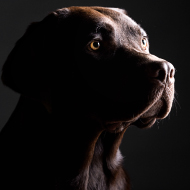
Team already working on a treatment for the mutation
University of Pennsylvania researchers have for the first time identified the gene responsible for night blindness in dogs.
Understanding the exact mutation that causes the condition will mean that researchers can get to work on finding a suitable treatment.
Congenital stationary night blindness (CSNB) is a heritable condition that is present from birth and can arise from mutations in several genes. Humans with this condition have virtually normal vision during the day, but struggle to see objects in low-light conditions.
In 2015, researchers from Penn’s School of Veterinary Medicine announced they had discovered a form of true CSNB in dogs. This new research builds on this work, utilising genome sequencing to identify the responsible genetic mutation.
In the study, researchers analysed 23 closely-related dogs, of which 12 had CSNB and 11 were unaffected. They compared their findings to an international dataset containing genome information from more than 250 dogs.
They found a mutation that affects the LRIT3 gene, involving the deletion of one basepair, causing the resulting protein to be truncated. Notably, LRIT3 mutations have also been implicated in CSNB in humans.
Once they had identified the LRIT3 mutation, they were able to confirm that it was the gene responsible by examining tissue from affected dogs.
“We have indeed nailed down the exact genetic mutation that is causing this disease,” says Keiko Miyadera, an assistant professor of ophthalmology at Penn’s School of Veterinary Medicine and the senior author on the paper.
“The next stage is to work on treating this condition; that is to come, and we’re very excited about it.”
The study is published in the journal Scientific Reports.



 The Veterinary Medicines Directorate (VMD) is inviting applications from veterinary students to attend a one-week extramural studies (EMS) placement in July 2026.
The Veterinary Medicines Directorate (VMD) is inviting applications from veterinary students to attend a one-week extramural studies (EMS) placement in July 2026.